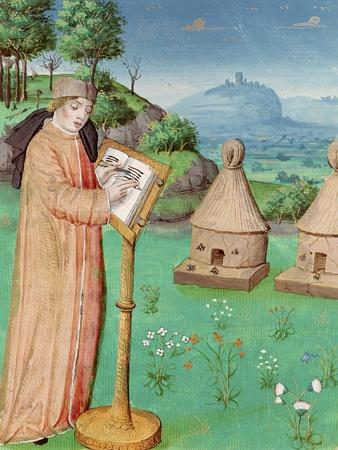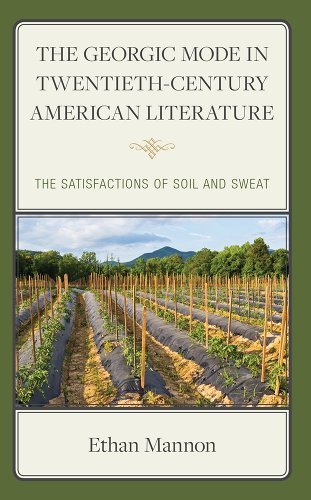An essential step in becoming a perceptive reader of nature writing is to learn the difference between pastoral and georgic. The distinction often comes as a revelation. Whereas pastoral derives from the shepherding tradition of Virgil’s Eclogues and emphasizes the idyllic life of nature, georgic gets its name from Virgil’s titular poem concerned with the painstaking labor, environmental and seasonal conditions, and soil conservation and animal husbandry of actual farming. So, for example, when some call out Wendell Berry for idealizing rural life, the sophisticated reader is prepared to defend his work as decisively more georgic than pastoral.
But is Berry’s work more georgic than pastoral? In his well-written, richly researched academic book The Georgic Mode in Twentieth-Century American Literature: The Satisfactions of Soil and Sweat (2024), Ethan Mannon contends that Berry is indeed an exemplary georgic writer. He correctly identifies as “georgic” Berry’s more than 50 years of work defending small farms and conservationist methods for the health of the land and natural community. And yet the distinction leaves me a bit unsatisfied. Let’s be honest: some of Berry’s works do idealize nature and community, but, I would argue, this pastoral element arises from an eternal, transcendent perspective rather than from some nostalgic longing for a pre-industrial way of life. Consider the Dantean frame of Jayber Crow, the scriptural voice of the Sabbath poems, or the Augustinian memory of Andy Catlett, Port William’s resident historian. These examples pose a problem for the conceptual distinction Mannon wants to maintain. What if pastoral and georgic, in the best of literature, combine and co-mingle? Mannon does examine how georgic-minded writers often evoke pastoral to undermine it, and georgic in Mannon’s telling captures the “tensions of rural living,” but I wonder if his efforts to rightly correct the simplistic criticisms of certain American authors lead him to elide some of the vital nuances found in their imaginative works.
Mannon’s book is a work of “ecocriticism,” a type of academic writing that seeks to highlight connections between the real presence of nature and the texts literary writers have composed about nature. Mannon, a farmer of sorts himself, is particularly skilled at describing and evaluating the precise details of animal husbandry, beekeeping, and small-scale farming as these arise in literary texts. But as a result, his scope of American literature remains fairly narrow, even more so than his title would suggest. Rather than being a comprehensive explanation and interpretation of georgic farming in modern and contemporary American literature, this book selects a handful of representative texts that Mannon believes are essential for recovering the georgic mode.
For example, Mannon’s opening chapter on Robert Frost examines only three poems. Other chapters hold to broader readings of the literary careers of Wendell Berry and Willa Cather (Louis Bromfield, a popular mid-twentieth-century novelist, receives similar thematic treatment), but these chapters are not arranged chronologically, for Mannon’s main objective is to forward an ecocritical argument rather give a fresh account of literary history. He insists we should recognize the georgic mode more frequently and intentionally as we read nature literature. This category, he believes, can help us better learn from literary texts to steward the earth and enjoy the labor of working with nature rather than exercising unlimited dominion over it.
As a professor of American literature, I have to confess I was somewhat disappointed by the lack of historical argument. I regularly teach survey courses of American literature, both early and modern, and I had hoped to learn more about the conditions that contributed to the georgic recovery in modern American literature. But the best-known historical-literary moments that are adjacent to Mannon’s subject—the Southern Agrarians, the anti-modernist reactions of Frost and other formalist poets, the revival of regionalism, the back-to-the-land movements—receive scant attention here. This book will no doubt hold relevance for “ecocritical” scholars, but I also wonder whether Mannon’s readings of nature literature are attuned enough to debates of race, gender, and settler colonialism to satisfy that crowd. Probably all of us academics have this concern today. I sometimes get asked, “as a literature professor, how do you avoid becoming ‘woke’?” To be honest, I’m not sure I avoid it altogether, to the chagrin of my South Carolina neighbors. But I do not think the solution is to isolate and find a “safe” literature that somehow avoids the debates of the broader field.
Not that I think Mannon is seeking to avoid questions of race, gender, and imperialism entirely. In fact, he is at times quite astute on how the georgic mode tends to operate in the shadow of war and histories of violence. But I do think Mannon’s ecocritical recovery of georgic could be more closely integrated with common talking points about modern and contemporary American literature. And these don’t have to center on the above trinity. More conventional questions concerning modernism, the form of the novel, and the artificial divide between highbrow and low-brow literature, etc., would seem pertinent here. Being acquainted with Mannon, I have no doubt that he sees the relevance of georgic’s history for American literary history and the reason why certain authors are passed down and continue to be studied. Perhaps we should consider this book a valuable primer on the georgic for discussions of nature in modern American literature, with more to come from Mannon and other like-minded scholars.
I often found myself surprised at what Mannon uncovered in his research but wishing he had expanded on some of these revelations. Who knew that Herman Melville wrote a paean to draft horses in Redburn? What untold threads might have been passed down through that avant-garde novelist to the likes of John Steinbeck in Grapes of Wrath? Yet neither writer receives more than a page or two of treatment. I loved Mannon’s inclusion of Samson’s riddle about honeybees in Judges 14, and it made me wonder about the biblical celebration of honey intersecting with Virgil’s beekeeping instructions in the fourth Georgic. Do literary texts harken back to these two poles—for example, what about his later, albeit brief discussion of the singer-songwriter Andrew Peterson’s account of beekeeping? But the ecocritical frame keeps Mannon focused on the real presence of nature, with occasional forays into texts that function to highlight why we need the georgic’s complexities. Mannon is right to assert that reading literature this way is “intensive,” a “means of combining existing discourses.” But we still need literature to read and teach, that is, works we can pass on and celebrate as integral texts. Frost’s North of Boston, Berry’s Mad Farmer poems and rural fiction, and the occasional Cather novel make Mannon’s shortlist, but surely others exist and need more attention.
Mannon’s Georgic Mode should be commended for its lucid prose, unsurprising from a scholar who himself remains close to the earth, and a coherent argument that can inspire other readers to apply the georgic to different contexts. As Mannon memorably puts it, “the georgic mode has dirt under its fingernails, callouses on its hands, and sweat stains on its shirts.” This kind of scholarly writing dignifies earth labor and can expand our delights and loves beyond the consumeristic mirage of American life. It can also help us perceive those moments in literature when the laborer becomes the unsung hero. As a result, we can better resist our culture’s obsession with scandal and hypocrisy or with airbrushed idealism and turn instead to valorize the virtuous, the faithful, the diligent: workers in the kingdom of God, as Berry has it, rather than mindless American consumers. Do we love the soil and the creatures put in our stead, or do we prefer the images our devices project at us? While the choice is not always so cut and dry, Mannon’s book can help us begin to retool our imaginations and ennoble common labor again.






